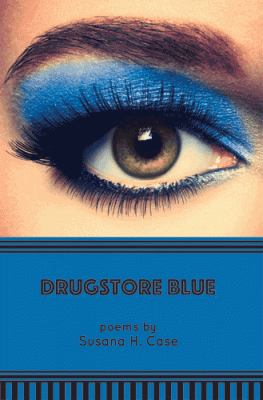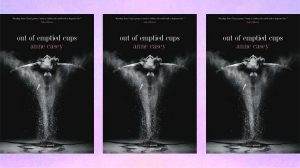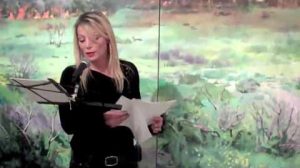Drugstore Blue by Susana H. Case / Five Oaks Press / 2017 / 9781944355340 / 71 pages
 Susana H. Case is an American original. In poem after poem, book after book, she brings her incisive wit and poetic flair to a variety of landscapes and situations. In Earth and Below (2013), Case explored the worlds of workers who mine the earth for copper. In 4 Rms w Vu (2014), she mined the urban domestic sphere for wide-ranging explorations of the searing dis/connections between lovers, partners, family members, and others intertwined. Case’s latest collection of poems Drugstore Blue covers a broader range of setting and similarly does not disappoint.
Susana H. Case is an American original. In poem after poem, book after book, she brings her incisive wit and poetic flair to a variety of landscapes and situations. In Earth and Below (2013), Case explored the worlds of workers who mine the earth for copper. In 4 Rms w Vu (2014), she mined the urban domestic sphere for wide-ranging explorations of the searing dis/connections between lovers, partners, family members, and others intertwined. Case’s latest collection of poems Drugstore Blue covers a broader range of setting and similarly does not disappoint.
As its title intimates and the epigraph by C.D. Wright (“…Love, blue. Hallucinogenic blue, love”) announces, the collection’s leitmotif is the color blue. However, this is far from the blue of melancholy or the blues in any traditional or expected sense. Case’s blue is vibrant, pulsating with energy, and, dare I say it, electricity. The color blue appears in “I Think of My Mother and Father, the Early Years,” the very first poem of the book, announcing its presence unexpectedly in the last line (“For now, the sky is the clear blue of his eyes.”) and continues in unforeseen ways throughout.
Even if these poems aren’t within the genre of romantic blues, blue here is nevertheless intertwined principally with love. In the title poem, the protagonist, “eyelids drugstore blue,” revisits the object of young love at various stages: its heyday in high school, years after high school clad in “drug-rumpled” clothes, and finally, in the poem’s devastating conclusion, as she scans the “school’s dead list.” In other poems, such as “Don’t Talk (Put Your Head on My Shoulder,” blue is implied. Here, the protagonist and her high school boyfriend, an immigrant, walk along the ocean waves as he recites the song that is the poem’s title without grammatical error. In the poem “The Rare Blue,” Case presents perhaps her most extended meditation on the color blue:
It was the year of blue eyeshadow
stolen from drugstore displays, tubes
stuck in the space
between adolescent padded breasts.
Blue was a carapace, between violet and sage,
eyelids the color of the deep violent sea,
hue the infinity of Vishnu,
sky figure, delft jar glazed to look like porcelain,
Persian porcelain,
King Tut’s stained eyebrows
on his funeral mask,
the mask of my face as I walked from the store,
my crew of girls casual behind me. (p.12)
In this stanza, Case moves artfully from a playful naming of the year to an almost casual mentioning of youthful theft amid bodily insecurity to reflections on the color framed by various cultural references and then back again by verse’s end to the speaker and her friends. This interplay between the fraught quotidian and the larger historical drenches the memory under examination with a kind of neon ache.
In some of the poems, the terrible cost of love, or arguably its proximity to indifference or hate is laid bare. In “After the Bitter Orange,” the sight of a tourist photographing tile designs leads the poet to remember the feel of “the man who doesn’t love her anymore” etched into her skin. “Acid,” one of the most haunting poems in the collection, tells of a woman suffering from the physical, emotional, and psychic trauma caused by the acid poured on her by her husband.
Case’s reimagining of accepted patterns is evident even in the collection’s overall architecture. The book begins with a section called “Home,” continues with “Hourglass” and “All Roads Lead Out of Town” and concludes with “The Ghosts that Give Directions.” Instead of ending with home, Case commences from a place of (seeming) familiarity and moves outward and further afield. Only with the book’s last poem, “Bushwick Blue” (“Is blue the color of Bushwick hip? … Am I Bushwick? Am I blue?”) does she bring the poetic arc back to its site of origin. At the poem’s (and the book’s) end, the reader is compelled not so much to answer Case’s question, but to marvel at her technical bravura, her pop élan, and her penetrating poetic vision.





Leave a Reply